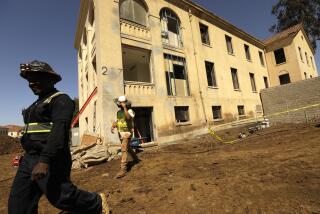Veterans Tell It Like It Was, for Posterity
- Share via
WASHINGTON — The National World War II Memorial will be dedicated today amid fanfare and festivities -- but perhaps the most significant commemoration of the wartime experience is to take place within a tented pavilion nearby.
An estimated 800,000 people -- mostly members of the World War II generation and their families -- are expected for the weekend’s activities on the National Mall. The Veterans History Project plans to make full use of their numbers by collecting as many reminiscences as possible for an oral history project to preserve, “for all time, veterans’ own words of what war is like,” said Beverly Lindsey, the project’s director.
So far, 15,000 men and women, military and civilian, have documented their wartime experiences. Because an estimated 1,100 World War II veterans die daily, the project has taken on a new sense of urgency.
The Veterans History Project was initiated in October 2002 as “an attempt to preserve an important part of American history -- our vets’ memories,” said Rep. Ron Kind (D-Wis.), who wrote the legislation authorizing it. The Library of Congress is coordinating the collection with the help of more than 100 partners, including veterans and military organizations, libraries, universities and civic groups.
“It is really America’s project,” senior project officer Peter Bartis said.
The stories’ personal viewpoints are making history more tangible for members of one of the project’s partners -- the students in Rutgers University’s oral history department.
Sandra Holyoak, director of Rutgers’ history archives, described the reaction of one of her student interviewers.
“This is amazing,” the student told her. “I have to get permission to drive the family car, and he was flying a B-17.”
For another, the oral histories meant an opportunity to explore a role he was about to fill.
“There was a student in the ROTC who chose to interview only vets serving in roles similar to the one he will assume in Iraq come July 1,” Holyoak said.
The oral histories also can help civilians understand the extent of wartime sacrifices.
“Whether people agree with the war in Iraq or not, at least they realize that these troops are someone’s sons and granddaughters,” Holyoak said.
Tom Swope, 51, of Mentor, Ohio, has conducted 300 interviews for the project. Swope, a radio commentator, got involved through his uncle, a Veterans of Foreign Wars post commander who asked whether Swope had any memorabilia from his late father to contribute.
Swope passed along what he had -- but, he said, he also “thought someone needed to make the project happen.” Swope developed a radio show called “Legacies: Stories from the Second World War,” which had its first broadcast July 4, 2002. The program has featured 125 veterans from northeast Ohio in 111 shows.
The facts of the war are well documented in books, Swope said, but the oral histories help complete “the big picture.”
Many veterans have shared stories with the project that they had yet to tell even their own families, Bartis said.
The collected memories also are serving as resource material. The project recently received an inquiry from Israel about American veterans who took part in the liberation of concentration camps.
Four hundred volunteers will be on hand this weekend to conduct interviews, including staff from the project and the Library of Congress, 50 high school students from St. Andrew’s Episcopal School in Potomac, Md., students from West Virginia University’s journalism school and members of the Delaware County, Pa., chapter of the Young Marines -- the official youth program of the U.S. Marine Corps.
“It’s about time,” said Matthew King, 17, one of the Young Marines. “If it wasn’t for these guys, we wouldn’t be here.”
Because each interview takes 60 to 90 minutes, not everyone can be accommodated at the pavilion. Volunteers will pass out registration cards to request a project kit for at-home interviews.
Veterans or their family members also can go via computer to the project’s website, www.loc.gov/vets, and contribute their recollections using an online form. The project is seeking stories from all conflicts, from World War I through the Persian Gulf War.
“There’s a lot of feel-good respect for what people do in times of war,” said Diane Kresh, director of public service collections at the Library of Congress.
More to Read
Sign up for Essential California
The most important California stories and recommendations in your inbox every morning.
You may occasionally receive promotional content from the Los Angeles Times.













